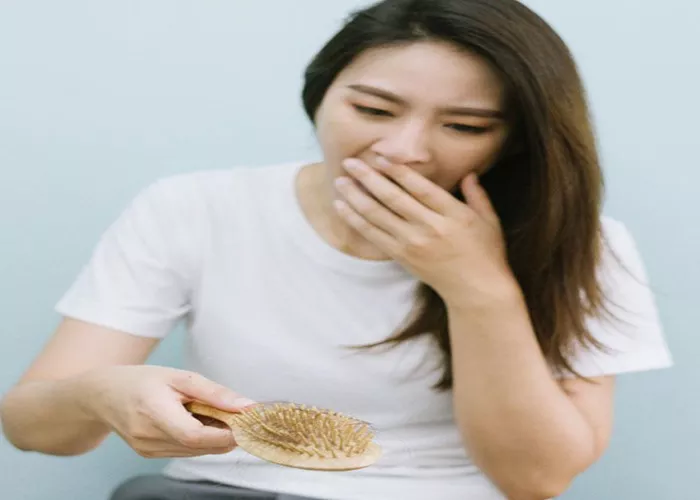Hair fall is a common concern that affects people of all ages and genders. While losing some hair daily is normal, excessive hair fall can be distressing and may indicate underlying health issues, nutritional deficiencies, or improper hair care practices. Fortunately, there are several natural ways to combat hair fall and promote healthier, stronger hair. This guide explores the causes of hair fall and provides effective natural remedies and lifestyle changes to help you maintain a healthy scalp and reduce hair loss.
Understanding the Causes of Hair Fall
Before diving into solutions, it’s essential to understand why hair fall occurs. Several factors contribute to excessive hair shedding, including:
- Nutritional Deficiencies: Lack of essential vitamins and minerals like iron, zinc, vitamin D, and biotin can weaken hair follicles.
- Hormonal Imbalances: Conditions like thyroid disorders, PCOS, and postpartum hormonal changes can trigger hair loss.
- Stress and Anxiety: Chronic stress disrupts the hair growth cycle, leading to increased shedding.
- Scalp Infections: Fungal or bacterial infections like dandruff or seborrheic dermatitis can cause hair fall.
- Harsh Hair Care Practices: Excessive use of heat styling tools, chemical treatments, and tight hairstyles can damage hair.
- Genetic Factors: Androgenetic alopecia (male or female pattern baldness) is hereditary and a common cause of hair loss.
- Environmental Factors: Pollution, hard water, and UV exposure can weaken hair over time.
Identifying the root cause of your hair fall will help you choose the most effective natural remedies.
Natural Remedies to Prevent Hair Fall
Scalp Massage with Essential Oils
Massaging your scalp improves blood circulation, nourishes hair follicles, and strengthens roots. Using natural oils enhances these benefits:
- Coconut Oil: Rich in fatty acids, it penetrates the hair shaft, reducing protein loss and preventing breakage.
- Castor Oil: Contains ricinoleic acid, which boosts circulation and promotes hair growth.
- Rosemary Oil: Studies suggest it may be as effective as minoxidil in stimulating hair growth.
- Peppermint Oil: Increases blood flow to the scalp, encouraging hair follicle activity.
How to Use: Warm the oil slightly, massage into your scalp for 10-15 minutes, and leave it on for at least an hour (or overnight) before washing.
Aloe Vera for Hair and Scalp Health
Aloe vera soothes the scalp, reduces inflammation, and unclogs hair follicles. It also contains enzymes that promote hair growth.
How to Use: Apply fresh aloe vera gel directly to your scalp, leave it for 30-45 minutes, then rinse with lukewarm water.
Onion Juice for Hair Regrowth
Onion juice is rich in sulfur, which boosts collagen production and strengthens hair. It also has antibacterial properties that fight scalp infections.
How to Use: Blend an onion, extract the juice, apply it to your scalp, leave for 30 minutes, then wash off with a mild shampoo.
Egg Mask for Protein and Nourishment
Eggs are packed with protein, biotin, and essential vitamins that repair damaged hair and prevent breakage.
How to Use: Whisk an egg, mix with a tablespoon of olive oil or yogurt, apply to hair, leave for 20-30 minutes, then rinse with cool water.
Green Tea Rinse to Reduce Hair Fall
Green tea is rich in antioxidants that stimulate hair follicles and prevent hair loss.
How to Use: Brew two green tea bags in a cup of water, let it cool, pour over your scalp after shampooing, leave for an hour, then rinse.
Dietary Changes for Stronger Hair
What you eat plays a crucial role in hair health. Include these nutrients in your diet to reduce hair fall:
Protein-Rich Foods
Hair is primarily made of keratin, a protein. Insufficient protein intake leads to weak, brittle hair.
Sources: Eggs, lean meats, fish, lentils, beans, nuts, and seeds.
Iron and Zinc for Hair Growth
Iron deficiency is a leading cause of hair loss, especially in women. Zinc helps repair hair tissues and supports oil glands.
Sources: Spinach, red meat, pumpkin seeds, chickpeas, and quinoa.
Omega-3 Fatty Acids for Scalp Health
Omega-3s nourish hair follicles, reduce inflammation, and add shine to hair.
Sources: Fatty fish (salmon, mackerel), flaxseeds, walnuts, and chia seeds.
Vitamins A, C, D, and Biotin
- Vitamin A promotes sebum production, keeping the scalp moisturized.
- Vitamin C aids collagen production and iron absorption.
- Vitamin D stimulates hair follicles.
- Biotin (Vitamin B7) strengthens hair and prevents breakage.
Sources: Carrots, citrus fruits, almonds, sweet potatoes, and leafy greens.
Lifestyle Adjustments to Minimize Hair Fall
Manage Stress Effectively
Chronic stress pushes hair follicles into a resting phase, leading to excessive shedding.
Tips: Practice yoga, meditation, deep breathing exercises, or engage in hobbies to reduce stress.
Avoid Harsh Hair Treatments
Frequent coloring, perming, and heat styling weaken hair. Opt for natural hairstyles and minimize chemical exposure.
Use a Gentle Shampoo and Conditioner
Choose sulfate-free shampoos and conditioners with natural ingredients like aloe vera, neem, or hibiscus.
Protect Hair from Environmental Damage
- Wear a hat or scarf in harsh sunlight.
- Rinse hair with filtered water if you have hard water.
- Cover hair in polluted areas.
When to Seek Professional Help
While natural remedies can significantly reduce hair fall, consult a doctor if:
- You notice sudden or patchy hair loss.
- Hair fall is accompanied by itching, redness, or pain.
- You experience unexplained weight loss, fatigue, or hormonal imbalances.
A dermatologist can diagnose underlying conditions like alopecia areata, thyroid disorders, or fungal infections and recommend appropriate treatments.
Conclusion
Stopping hair fall naturally requires a holistic approach—combining nourishing treatments, a balanced diet, and healthy lifestyle habits. Consistency is key; natural remedies may take weeks or months to show results. By understanding the causes of hair loss and adopting these natural strategies, you can restore your hair’s strength, vitality, and thickness over time. Remember, healthy hair starts from within, so prioritize overall wellness alongside external care for the best results.
Related topics:
How Can You Stop Hair Fall Due to PCOS Naturally?
Does a Hair Transplant Stop Balding?
How Can I Stop Hair Fall in the Shower? Simple Solutions


